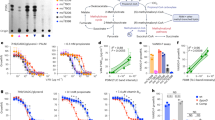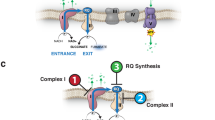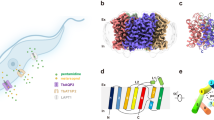Abstract
THIS communication describes an investigation of the effects of chloroquine treatment on the ultrastructure of Plasmodium berghei in the mouse and rat, and of P. cynomolgi in the rhesus monkey. Chloroquine was given to the animals intraperitoneally in doses which produced a detectable reduction in parasitaemia on the day after administration (50, 95 and 17.5 mg/kg respectively). Blood samples were fixed for electron microscopy (2.5 per cent to 5 per cent glutaraldehyde followed by 1 per cent osmic acid) before and after injection of the drug.
This is a preview of subscription content, access via your institution
Access options
Subscribe to this journal
Receive 51 print issues and online access
$199.00 per year
only $3.90 per issue
Buy this article
- Purchase on Springer Link
- Instant access to full article PDF
Prices may be subject to local taxes which are calculated during checkout
Similar content being viewed by others
References
Macomber, P. B., Tousimis, A. J., and Sprinz, H., J. App. Phys., 35, 3088 (1964).
Ladda, R., and Arnold, J., C.R. Acad. Sci., Paris, 260, 6991 (1965).
Ladda, R., and Arnold, J., Fed. Proc. Fed. Amer. Soc. Exp. Biol., 25, 558 (1966).
de Duve, C., in Lysosomes (edit. by de Reuck, A. V. S., and Cameron, M. P.) (Churchill, London, 1963).
Novikoff, A. B., and Essner, E., J. Biophys. Biochem. Cytol., 15, 140 (1962).
Brandes, D., and Bertini, F., Exp. Cell Res., 35, 194 (1964).
de Duve, C., Sci. Amer., 5, 64 (1963).
Thurston, J. P., Trans. Roy. Soc. Trop. Med. Hyg., 44, 703 (1951).
Thurston, J. P., thesis, Univ. London (1952).
Cohen, S. N., and Yielding, K. L., Proc. U.S. Nat. Acad. Sci., 54, 521 (1965).
Glinsmann, W. H., and Ericsson, J. L. E., Lab. Invest., 15, 762 (1966).
Bray, R. S., Studies on the Exoerythrocytic Cycle in the Genus Plasmodium (Lewis, London, 1957).
Warhurst, D. C., Parasitology, 55, 14P (1965).
Sen Gupta, P. C., Ray, H. N., Dutta, B. N., and Chaudhuri, R. N., Ann. Trop. Med. Parasitol., 49, 273 (1955).
Allison, A. C., and Young, M. R., Life Sci., 3, 1407 (1964).
Weissmaim, G., Fed. Proc. Fed. Amer. Soc. Exp. Biol., 23, 1038 (1964).
Cantrell, W., and Kendrick, L. P., J. Infect. Dis., 113, 144 (1963).
Warhurst, D. C., WHO/Mal./517.65 (1965).
Ahtee, L., and Paasonen, M. K., Ann. Med. Exp. Biol. Fenn., 43, 101 (1965).
Macomber, P. B., O'Brien, R. L., and Hahn, F. E., Science, 152, 1374 (1966).
Peters, W., Fletcher, K. A., and Staübli, W., Ann. Trop. Med. Parasitol., 59, 126 (1965).
Author information
Authors and Affiliations
Rights and permissions
About this article
Cite this article
WARHURST, D., HOCKLEY, D. Mode of Action of Chloroquine on Plasmodium berghei and P. cynomolgi. Nature 214, 935–936 (1967). https://doi.org/10.1038/214935a0
Issue Date:
DOI: https://doi.org/10.1038/214935a0
This article is cited by
-
Validation of a chloroquine-induced cell death mechanism for clinical use against malaria
Cell Death & Disease (2014)
-
Hemozoin Biocrystallization in Plasmodium falciparum and the antimalarial activity of crystallization inhibitors
Parasitology Research (2007)
-
Uptake of tritium labelled chloroquine into organized cultures of rat spinal ganglia
Acta Neuropathologica (1975)
-
Lysosomes, pH and the Anti-malarial Action of Chloroquine
Nature (1972)
Comments
By submitting a comment you agree to abide by our Terms and Community Guidelines. If you find something abusive or that does not comply with our terms or guidelines please flag it as inappropriate.



